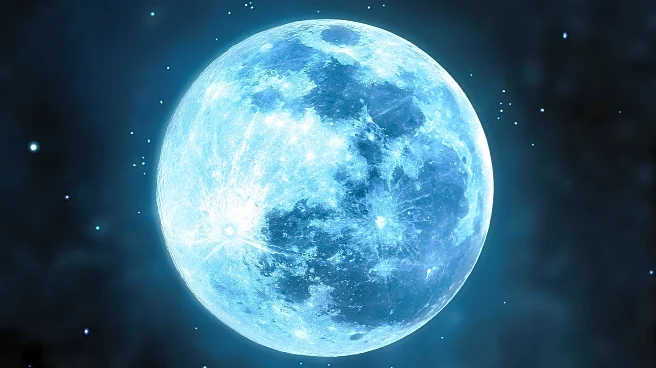What is the story about?
What's Happening?
On October 12, stargazers will have the opportunity to witness a celestial event featuring the constellation Orion and a half-lit moon rising above the eastern horizon. The event will occur shortly before midnight, with the red giant star Betelgeuse and Jupiter also visible in the night sky. Betelgeuse, a massive star nearing the end of its life cycle, is expected to eventually explode in a supernova, although this process could take tens of thousands of years. The constellation Orion will offer several naked-eye targets, including Orion's Belt and the Orion Nebula, a stellar nursery where new stars are forming. Observers are encouraged to use telescopes or binoculars to enhance their viewing experience.
Why It's Important?
This celestial event provides an opportunity for amateur astronomers and stargazers to observe and appreciate the wonders of the night sky. The visibility of Orion, Betelgeuse, and Jupiter offers a chance to learn more about these astronomical bodies and their significance. Events like this can inspire interest in astronomy and science, encouraging educational pursuits and public engagement with space exploration. Additionally, observing such phenomena can foster a sense of connection with the universe and promote awareness of the vastness and complexity of space.
What's Next?
Stargazers are advised to prepare for the event by selecting appropriate viewing locations with minimal light pollution. Using telescopes or binoculars can enhance the experience, allowing for a closer look at the stars and nebulae. As Betelgeuse continues its life cycle, astronomers will monitor its progress towards a supernova, which could provide valuable insights into stellar evolution. Future skywatching events will continue to offer opportunities for public engagement and education in astronomy.
Beyond the Headlines
The event highlights the importance of preserving dark skies and reducing light pollution to ensure future generations can enjoy and study celestial phenomena. It also underscores the role of amateur astronomers in contributing to scientific knowledge through observations and data collection. The cultural and historical significance of constellations like Orion, which have been recognized across various civilizations, adds depth to the experience of stargazing.















